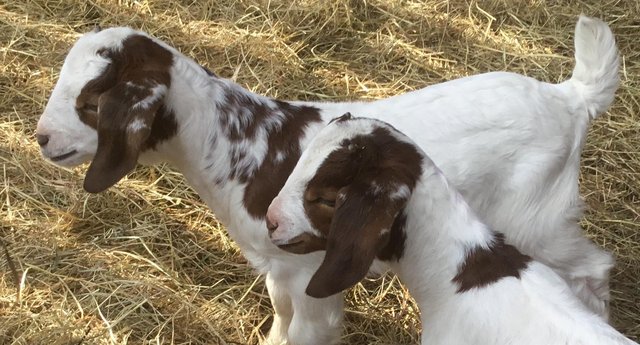

Newborn goat kids require special attention to their neonatal nutrition and sanitation to avoid any health challenges that may negatively impact their chances of growing to be a healthy, productive adult. Ruminants are born with minimal levels of immunity, making them susceptible to any number of bacterial infections in the first hours and days of life.
The feeding of colostrum (the first milk produced by the mother) is the primary means of bolstering the immune systems of newborn goats. The antibodies found in the immunoglobulin ( one of the primary proteins found in colostrum) is readily absorbed through the stomach lining (abomasum) during the first 10 to 12 hours after birth. After 12 hours, a kid’s ability to absorb the antibodies diminishes and after a day, antibody absorption will cease. However, colostrum can still be fed if available.
Goat owners may desire to let kids nurse with their mothers soon after birth. However, within the goat industry, caprine arthritis encephalitis (CAE) is a common ailment affecting the joints of adult goats. It’s believed that the infection is passed from mother to kid through the process of the doe licking the kid after birth. Therefore many goat owners make the extra effort to be present at births and immediately separate the kid from the mother, drying the kid and bottle-feeding collected colostrum.
Besides the potential of spreading CAE at birth, keeping newborn kids free of mud or manure will help prevent the introduction of bacterial infections coming from coliform, campylobacter or staphylococcus. Maternity areas where birthing occurs should be clean and have pathogen-free bedding.
There’s no suitable replacement for natural colostrum. The commercial colostrum replacers should be avoided altogether. If colostrum is not available for the newborn, raw cow milk is a better alternative than a commercial colostrum replacer. If cow milk is to be fed to newborn and young kidlings, it should be nonpasteurized. Pasteurization and homogenization of cow milk alters the fat and protein molecules, making them less digestible for goat kids.
The kids should be fed milk until they are three months of age to ensure that bones are developing correctly and their immune systems are strong.
When feeding newborn kids, close attention to the sanitation of feeding equipment is essential. Bacteria grows quickly on uncleaned equipment, and new milk should never be added to old milk that has been sitting around for many hours. Even with a group feeding systems for kids, the buckets and nipples must be cleaned daily.
In newborn goats, the rumen has yet to develop. When kids are born the abomasum is the primary stomach chamber and its function is similar to the human stomach – food and milk is broken down by enzymes and acids. So it’s very important that the milk that’s fed to the baby goat is “milk based.” The abomasum in young ruminants does a poor job of digesting plant protein
In goats, rumen development seems to progress rapidly, enabling kids to begin digesting soft hay or grasses by the second week of life. Kids will begin nibbling at hay and other forages a day or two after birth. So solid feed should be made available to the kids immediately. Though they may not derive a lot from nutrition forages in the first weeks of life, the forages help introduce the bacteria necessary for the rumen development as they grow.
Young goat diets also should include a vitamin and mineral supplement as well as plenty of clean, fresh water. Proper diets at the beginning of life and an environment free of pathogen contamination will result in a healthy, productive goat that will remain in the herd for many years.
 Contact Jaguza Support
Contact Jaguza Support